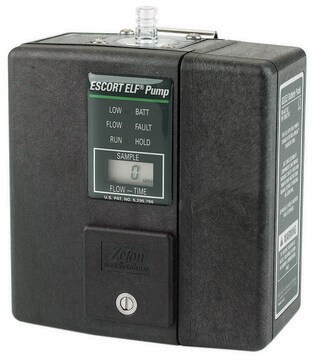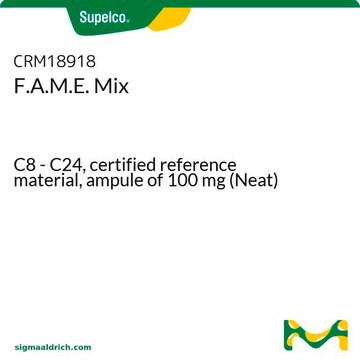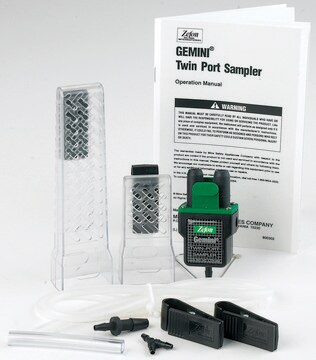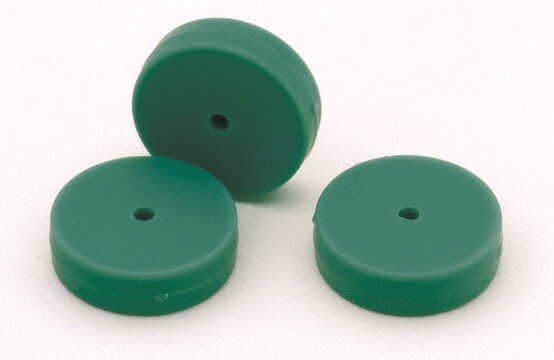23159
Thermogreen® LB-2 Septa, solid discs
diam. 17 mm ( 21/32 in.), pkg of 50 ea
Sign Into View Organizational & Contract Pricing
All Photos(1)
About This Item
UNSPSC Code:
41115718
Recommended Products
packaging
pkg of 50 ea
parameter
at 100-350 °C (operating range)
diam.
17 mm ( 21/32 in.)
compatibility
for plumbing Finnigan TRACE™
for use with Fisons 8000 series
Looking for similar products? Visit Product Comparison Guide
General description
Septum is a very important component of syringe injection system. They are usually fabricated from elastomeric, self-sealing materials such as silicone rubber, neoprene or fluoroelastomers. It is suitable to conveniently introducing the sample without causing the system to leak. Improper septa decomposes under the high-temperature conditions of capillary inlets, causing baseline disruption and ghost peaks in a chromatogram.
An improved version over the original Thermogreen LB-1 septa.
- Extremely low bleed over a wide range of inlet temperatures (100 °C to 350 °C)
- Already conditioned, ready to use
- Easier needle penetration and high puncture tolerance (ideal for autosamplers)
- Rubber formulation exclusive to Supelco
Application
Thermogreen® LB-2 Septa is suitable for the following applications:
- To minimize extraction onto or loss of analytes off the Solid phase microextraction (SPME) fiber from the vial during analysis by GC-MS.
- Thermo-resistant septa is used in GC instrument to avoid carrier gas leaks, extraneous peaks and phthalate contamination.
- Thermo-resistant septa along with thick needle protector is used in GC instruments to avoid damage irreversibly caused by microsyringe.
- It is also used in the influent sampling ports in gas chromatographs.
Legal Information
TRACE is a trademark of Thermo Fisher Scientific or its subsidiaries
Thermogreen is a registered trademark of Merck KGaA, Darmstadt, Germany
Choose from one of the most recent versions:
Certificates of Analysis (COA)
Lot/Batch Number
Sorry, we don't have COAs for this product available online at this time.
If you need assistance, please contact Customer Support.
Already Own This Product?
Find documentation for the products that you have recently purchased in the Document Library.
Elefteria Psillakis et al.
Chemosphere, 54(7), 849-857 (2003-11-26)
The sonochemical degradation of aqueous solutions containing low concentrations of six phthalate esters at an ultrasonic frequency of 80 kHz has been investigated. Ultrasonic treatment was found capable of removing the four higher molecular mass phthalates (di-n-butyl phthalate, butylbenzyl phthalate
Solid-phase microextraction (SPME) for rapid field sampling and analysis by gas chromatography-mass spectrometry (GC-MS).
Hook, Gary L., et al.
TrAC, Trends in Analytical Chemistry, 21, 534-543 (2002)
Elefteria Psillakis et al.
Journal of chromatography. A, 999(1-2), 145-153 (2003-07-30)
A simple and efficient liquid-phase microextraction (LPME) technique using a hollow-fibre membrane, in conjunction with gas chromatography-mass spectrometry has been developed for the extraction and analysis of six phthalate esters in water samples. Parameters such as extraction solvent, agitation of
R.L. Grob, M.A. Kaiser
Environmental Problem Solving Using Gas and Liquid Chromatography, 166-166 (2000)
Robert L. Grob, PhD, Eugene F. Barry, PhD
Modern Practice of Gas Chromatography, 471-472 (2004)
Our team of scientists has experience in all areas of research including Life Science, Material Science, Chemical Synthesis, Chromatography, Analytical and many others.
Contact Technical Service








